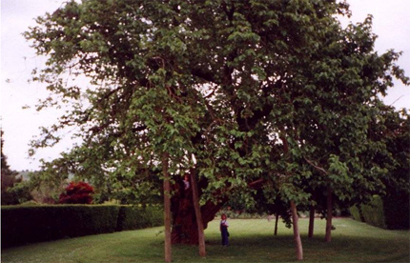Posted by Judy Rozzelle Jun. 26, 2007, 12:34 pm
Like the crocuses, humidity, and poison ivy, I arrive back in Shuffletown in the spring. However, this spring, I arrived looking totally different than I intended. My appearance has startled a fair share of friends, neighbors, and specifically, my brother, Frank, who tried not to speak to me at church. When my daughter saw my haircut and the shock of yellow trim coloring my bangs, she asked, “Mom, did you join a military cult?”
Along the way, in the light of camp fire flames, Jack became the logo, the team mascot for those cold, homeless, indentured people who were thrown out of one country into a foreign and uncharted land never to see home, again.
My son asked, “When did you switch to barber shops?”
In my defense, let me assure all who have seen me that I had no intention of returning home looking like an aged back up singer for the rock and roll band, Pink Floyd or an older version of the pop singer, Pink.
The haircut is the result of an innocent comment I made to my hair stylist. All I said was, “I will not be back for three months.”
That comment resulted in my hair stylist feeling duty bound to give me a trim that was would last three months. I won’t even try to explain the yellow streak of hair on my forehead, but it had something to do with covering up the gray that would obviously appear like weeds at the front of my hair.
Living as a Southerner in Los Angeles is a cultural challenge, but I do not fault anyone but my Scots-Irish ancestors for the cultural differences between the South and the West. The West coast, like most other sections of the country, considers the South a foreign section of America where NASCAR rules, folks eat grits, drink sweet tea and the living is easy because we don’t do much more than fish and sweat in the humidity, even though today, Charlotte bears the stigma of being a major commercial and banking center. This fact rolls unnoticed through their minds like water off a duck’s back. They mean well, they treat us nicely, but they are pretty sure we are a different breed of folks and they are right.
In the South, we are descendents of the Scots-Irish and they bestowed on their descendants a sturdy strain of individuality that is considered a mark of honor. Our heritage is the Scottish spirit of horse sense, and humor, plus the Irish passion for story telling.
The Scots-Irish told Jack Tales by campfire coming down the wagon trails that wound from Pennsylvania into the South. The most commonly recognized Jack Tale is “Jack and the Bean Stalk,” but there were many more. Jack Tales came from the European tradition that if there were three sons in the family, the first born would inherit the land, the second son would be given a military commission, and the third son, well, he was expected to join the church as a priest or make his way through the world on his own and live by his wits. The third sons who chose to wander became known as Jack.
Along the way, in the light of camp fire flames, Jack became the logo, the team mascot for those cold, homeless, indentured people who were thrown out of one country into a foreign and uncharted land never to see home, again. They bolstered their courage each night by the camp fires and they told stories of the wondering Jack. In these stories, Jack fought the devil and won; he defeated death; Jack made fortunes; Jack was canny and clever. They were Jack and they would be clever and they would also survive. Jack made them laugh when the strange animals howled from the woods; he inspired them to keep hunting when there was no food left. Jack’s personality became the measuring stick for courage, determination, and most of all, wit. Jack set the bar high and his people, our ancestors, were determined to be individuals and further, Jack laid out the basic foundation for Southern humor. Matching wits in the South is a blood sport and always entertaining. These duels of wit, the pranks played, and the lessons learned evolve into new Jack Tales, and we practice the art with delight and retell our stories passionately for the entertainment of others and ourselves. The best place to hone this art is at home, in the south among friends. I have been home for two weeks now and it is like breathing pure oxygen. It has also taught me why I got in this hair mess and why I still go out in public.
The evolution of Jack Tales is found in the stories passed from person to person in local Southern communities. These antics and stories give us the strength we inherited from our ancestors. They provide the continuing strength we all need to face the challenges of life.
I was reminded of this recently when talking with Corky and Susie McClure. In his youth, Corky ran with five friends, Ron Kenley, Billie Don McClure, Butch Thompson, Jim Skinner, and Dewey Sanders.
“There wasn’t a day that went by that one of us didn’t pull a prank on the others,” Corky said. “Dewey was the most unpredictable. But each day, after the chores were finished or school was finished, someone was planning a joke. All those years, none of us completely dropped our guard.”
The pranks continued when they became young adults. One evening, one of the young men decided that since he had not been invited to attend an evening of bridge that he would streak through the house butt naked during the bidding. It was a couples’ bridge game to be held at Corky’s house. The prankster told Corky of his plans and asked that Corky tie up his dog and open the back bedroom window so he could escape after his romp in the living room. However, Corky neglected to tie up the dog. He also shut the back bedroom window and locked it. At half past nine, the front door flew open and the man ran naked through the living room with Corky’s dog in hot pursuit. He disappeared into the bedroom, there was stunned silence, but quickly the prankster and the dog made an encore appearance in the living room heading back out the front door. Only this time, the dog was leading the way.
Recently, Dewey Sanders passed away. Several of the original friends came together at the hospital when Dewey was ill. During the waiting hours, they shared the often told tales of their pranks entertaining and comforting each other with their modern day version of Jack Tales.
This tradition of Jack Tales bolsters us today as surely as they did for our ancestors. And in the South, with each moment in life we are creating new stories and they are proof that today we have the same resilience as our Scots-Irish ancestors.
I have written about my friends, the Grumpy Old Ladies of Shuffletown (GOLS). I had dinner with them recently and punctuality is very important to the GOLS. The established tradition is to meet in Ginny’s yard at exactly six o’clock for Friday night dinners. Ginny set the time and the expected punctual arrival. I was two minutes late last week and all four of them were sitting in Martha’s car — with the engine running, waiting for me.
I jumped in the back seat and the evening began with the usual amount of teasing. During the evening, Ginny mentioned that she had seen a haircut similar to mine on another friend, “And,” Ginny continued, “It looked good on her.”
But it slipped out during dinner that the week before, everyone arrived in Ginny’s yard a little before six and waited for Ginny to come out of the house and get in the car. Ginny usually exits the house the moment the first car arrives, but on this night ten minutes went by, then fifteen minutes, finally, they decided to dial up Ginny on the cell phone. The phone rang several times before Ginny answered in a sleepy voice. She had been asleep on the couch. I will remind Ginny of this incident in the future — a Jack Tale in the making.
Just as one day in the future, my haircut will become my Jack Tale and when I am even older, it will assure me that surviving my own individuality gives me the strength to laugh as life goes on.
These individual stories are remembered because they still give us comfort against the unknown and the good sense to laugh at ourselves. We may not win every battle or defeat death, but Dewey Sanders left a continuing legacy for his friends and his family when he lost his battle with death.
Following his funeral, Dewey Sanders’ casket was carried to the cemetery by four white horses pulling a restored Mennonite hearse complete with glass windows and brass accessories. Dewey went out in style and the story of his grand departure will be passed from generation to generation as another Jack tale of courage against even the finality of death.
Yes, we are a different breed in the South, and we have stories to tell to prove it. Judy Rozzelle



